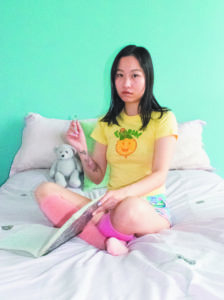Power puffed, totally spy, y2k nostalgia bomb, Sunny Chen eminates duality via music alterego “Sad China.” They are a do-it-all mastermind, crushing it in pop stardom, acting, heart + mind healing and more. Honestly, knowing their origin story, it all tracks. They’ve been a natural born icon since they could talk, singing karaoke in their family’s restaurant in China. They pull from their own pain and challenges to champion wellness for creatives, representation for BIPOC of marginalized gender identities — and they always tell a story. Stories which youth can see themselves reflected in, when Sunny issinging, creating, joyous, vulnerable, leading, acting and frankly, just being super cool. Sunny and I unpacked what makes Sunny ‘Sunny,’ and also what makes Sunny ‘Sad China.’ We also discussed the ways that Vancouver’s music infrastructure notoriously sucks, wellness consultation, and How To Persevere & Step Into Your Excellence: 101. Sunny’s kindness leaks out like light from a star. It is unmistakable, warm and entrancing. It’s in the projects they spearhead (wait till your hear about “Sound Therapy”) It’s in the way they insisted I had a cup of tea while I sat in their living room, and it’s in their frequent, glowing affirmations and advice (which, I had to cut from this piece because they blew the word count out of the water.) Plain and simple, Sunny is a supernova. Not just a star, not even the sun, but something more dynamic and powerful. From “y2k nostalgia bomb” to “supernova,” call them what you will, but Sunny Chen is always a radiant energy force.
M: Who is Sad China, and would you say there’s any dissimilarities between who Sad China is, compared to Sunny Chen?
S: I would say Sad China is definitely someone who is more open and sure of themselves. In a way, it’s like I am distilling everything about me into a more understandable persona. Because Sunny is more complex than Sad China. Sad China is all the things I really really need people to understand about my art and my music.

M: The core of almost all your bodies of work seems to be vulnerability. What was it like deciding (or rather, discovering) to create such earnest content that revealed those vulnerabilities?
S: I think a lot of it has to do with my childhood, as everybody says, but it’s true. I was going through a lot, and I was raised by narcissists so because of that, I never had been granted space by my family. So I really used art as a way to express myself.
M: In a similar vein, fearlessness is also something that is fixed to a lot of your work. You seem to do everything with full authenticity and commitment. So have you always been so brave? Or, if not, how did you get there?
S: That’s very interesting. Because when I was in China, I definitely was fearless. My family owned a restaurant and there was karaoke there, so I used to perform Karaoke for all the customers when I was small. My grandma tells me all these stories that she has from when she took care of me. When I moved here, it was so strange because suddenly I didn’t speak the regular language. Suddenly, I wasn’t seen as “the regular” student. I was an outsider. I experienced being made fun of, and felt like I wasn’t attractive. So, I definitely had stage fright throughout high school and I actually had to unlearn all of that. When I am Sad China, I know that everyone in the room is a friend and they want to hear what I have to say. So it’s easy to be fearless. As Sad China, or as Sunny Chen when I’m on set.
M: Even though you are incredible, you aren’t invincible. What has been your biggest challenge as a creative in the music lane and the acting lane?
S: Okay, so the biggest challenge in music has definitely been difficulty finding mentors. Whenever somebody had all the equipment, all the resources, and were making music, they were usually cis men in their mid-to-late 30s. All they saw in me was an object to fetishize — not someone to actually work with. They saw me and thought, “I’m gonna try to sleep with this girl.” That really set me back because I was 20, and I didn’t know how to judge characters. I just trusted everybody.

M: That is so real. I feel like in all the interviews I do, what we end up talking about at some point is how the industry has such a problematic old white man resource network, one that QTBIPOC are excluded from. It’s crazy that it comes up every time I interview a femme artist of color in Vancouver. I could talk about it forever.
S: Yeah, it’s actually a huge issue. I recently received a Creative BC grant to curate a music festival and run workshops to counter this.M: Oh my god, that’s amazing!
S: Thank you! The first workshop is going to be for survivors only, and the other will be community-wide. And we’re gonna talk about this stuff, because this actually affects so many people in Vancouver.
M: What has been an unexpected joy or benefit of pursuing your art and passions head on?
S: I would say my friendships and finding a community in Vancouver. Before I started releasing my own music, I definitely was seen more as just “someone’s girlfriend” (even though I’m non-binary.) But that has changed since releasing my debut album, and I made it with people who I have become quite close to. I think making music together helps me to see my friendships in a way outside of “going out with people.” Because I used to just be friends with people who I only partied with. Yeah…I don’t do that anymore.
M: That is so real. Among those friends, or even outside of your circles, who are s your creative influences across all disciplines? Acting, music, or even in your mental wellness and advocacy lane.
S: Honestly, lately, my musical influences have really narrowed due to the fact that I feel like bigger artists with creative teams are actually stealing my ideas — and they steal everyone’s ideas. That’s just how it is. So, my influences have really narrowed because I feel like I’M the one influencing people. But, for local inspirations I’m gonna say Kimmortal. Amazing. Love. Whenever I see them they would listen to me, understand me as an emerging artist, and they really reassured me when I wasn’t able to get a grant for my “Ocean Girl” music video. They really always brighten up my day.

M: Yeah, that’s really, really important. And grant struggles are truly a whole conversation. Especially because it’s the same pool of people in Vancouver applying for the same grants. It gets tense, and grants are hard enough without feeling like you’re in competition against other creatives.
S: Yeah. And at that time, 2017, literally 75% of the recipients were cis white men in bands.
M: How do you overcome the struggle of things like burnout, or maybe impostor syndrome while pursuing multiple major goals? If you experience those things at all?
S: Oh, yeah I definitely do. I literally almost burnt out last week. So I just cried all day in bed. And then I ate some instant noodles, and went back to cry. And then I took the next few days off. And I went back to my mom’s, and there was free food there. So I was fed. I literally just listened to my body. I definitely didn’t do this when I was younger I would literally just go, go, go, go, go. I would never have time to myself, and then I would be upset. Or just suddenly throw up because I was drinking too much when I was tired. Obviously, I was relying on substances and using all these things to cope with burning out. But that doesn’t make sense. Just rest. Rest is so necessary. Lastly, to get away from imposter syndrome, I had to get away from my exes. I had to meet people who supported me. And I’m really lucky and grateful to have that support now. I just want people to know that if you feel like nobody’s supporting you right now, please understand that it’s temporary and that you have to support yourself first. Part of that is getting enough rest, getting your health right. Maintaining your mental health, and, you know, all the basic things that make living comfortable and enjoyable., Our ancestors are always rooting for us.
M: So true. So, I know from being BIPOC and femme, it often feels so easy to assume that you’re not good enough to do it all, or to do it bigger and better than your more privileged counterparts in the lanes you’re pursuing. But it seems like you blow past that, like you do everything to its fullest. When did you realize that you were far more than your limited societal expectations?
S: That’s really interesting. I would say, part of that confidence and strength comes from growing up in my home country for six years —, because I was shining so bright there. Just having that desire to perform, and being supported during my most formative years really helped. I just want to understand people and I want people to understand me.That’s why I love listening to my friends’ music. That’s why I love listening to music in general. That’s why I love watching TV shows and getting to know characters. And being those characters.
M: Yeah, that makes a lot of sense.
S: Also, I’ve experienced roadblocks in each of my careers. When I wasn’t doing well with music, I could focus on making my web series pilot. When I wasn’t really booking acting gigs, I could focus on making music. So, I think having all these avenues is necessary as an artist, because especially as BIPOC artists, our revenue streams might not be full from just one aspect of our lives. So we have to find other ways to generate revenue, sustain our lifestyles and feel fulfilled.

M: Amazing. So wonderful. How do you stay so motivated? You’ve been crushing it for a long time, but do you ever have creative droughts, and what gets you through those moments? You said earlier that like, if one avenue isn’t really doing it, then you’ll go to another one. But is there anything you want to add about getting through those creative blocks and staying motivated?
S: So I have been doing some thinking, and I realized that every time it’s all about momentum — like, when something big is about to come out — like my album — something else happens. I booked a commercial that shot in Mexico City last year, and it was such a good trip. I’ve never traveled to Mexico, and I’ve never traveled for work. It was super short notice — so I literally had to reschedule things, and book other studio sessions…and then I just left. So, my advice is to always go with the flow, and to check in with yourself.
M: Being in the spotlight can be an intense feeling. Have you experienced mental health challenges with having such a significant media presence? How do you get through that?
S: I’m gonna say, literally everyone has an intense social media presence right now. It’s not just me. Even actual children. It definitely takes a toll on our mental health and I think it’s important to take breaks — that’s why I deleted Instagram from my phone. And it feels really good. So I really suggest taking even just a one day break, if that’s the most you can do.
M: Okay, so what has your mental wellness journey looked like? And how did you come to be a mental wellness consultant?
S: On the topic of mental health struggles, I really reach out to my friends. I will literally text somebody I trust saying, “I’m having a horrible day.” I put that out into the universe to be received, because we all deserve to be supported. I’ll text like four people that message, and one of them will be like, “I’ll call you right now.” One might say, “I’ll call you tomorrow,” or they might just text you for a bit. But just knowing that somebody has heard me, and is validating me, that’s so helpful.
M: Next, what’s something you’re looking forward to? That can be art, life, work, anything!
S: Sound Therapy, the music festival I’m curating will be in August. Oh, and also just settling into my new, beautiful home in Surrey!


